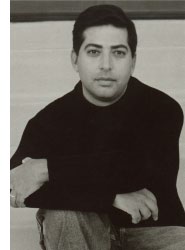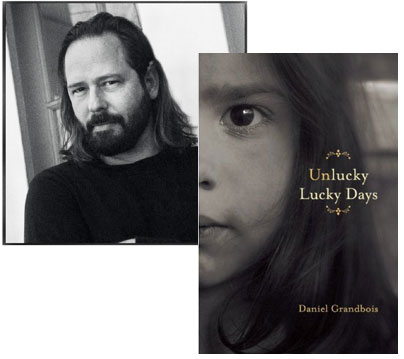Tod Goldberg: Pop and Loving It
 Three years ago, I ran an email exchange between brothers and authors Lee and Tod Goldberg; about a year and a half later, I finally met Tod when he moderated a panel at the Los Angeles Times Festival of Books where I got to defend the Internet against its latest critic. Recently, Tod landed a gig writing the tie-in novels for Burn Notice, which is one of my favorite current TV shows, and last weekend he wrote an essay for the Times about how it’s moved him from “a career in the literary fiction trenches, where acclaim is something you hang your hat on, since you haven’t made enough money to buy a hat rack,” to a state of affairs where “I am now, apparently, a briskly selling crime writer.”
Three years ago, I ran an email exchange between brothers and authors Lee and Tod Goldberg; about a year and a half later, I finally met Tod when he moderated a panel at the Los Angeles Times Festival of Books where I got to defend the Internet against its latest critic. Recently, Tod landed a gig writing the tie-in novels for Burn Notice, which is one of my favorite current TV shows, and last weekend he wrote an essay for the Times about how it’s moved him from “a career in the literary fiction trenches, where acclaim is something you hang your hat on, since you haven’t made enough money to buy a hat rack,” to a state of affairs where “I am now, apparently, a briskly selling crime writer.”
It couldn’t happen to a nicer guy. And I can’t wait to read the book.
(He also has some interesting things to say about how his feelings about the show have subtly changed, and about how other authors feel about the tie-in game.)
26 August 2008 | uncategorized |
Daniel Grandbois and the Trickster Gods of Short-Short Fiction

You can read just about any of the stories in Daniel Grandbois’s Unlucky Lucky Days in under three minutes; while a few spill over onto a second page, most are just a few paragraphs. Here, for example, is the entirety of “The Tunnel”:
A man and a woman stepped into a tunnel. It was lighter inside than they had expected. In fact, the deeper they went the lighter it became until the light was so bright that it blinded them both.
The worlds in which these stories take place bear little resemblance to the ones in which their readers live… but there may be other relations to consider. In this essay, Grandbois discusses the magic he’s found in such tightly compressed narratives.
As Cairn terriers were bred to get into the crannies of Scottish cairns and root out little beasties, the short forms of literature scare such vermin of the human mind into the light. These places can’t be reached by the Great Danes, English Foxhounds, and French Poodles of the long forms, to whom the frantic little terrier may look like only a plaything. A step back reveals it is needed no less equally by the man.
Long forms make their homes most often in what is called realism, a natural setting for something of their size. Planets, for example, live, by comparison, in a more realistic place than do subatomic particles—at least when tallied by human common sense. Yet, each locale is buzzing with indispensible activity. In many ways, the short forms, like the subatomic realm, are the trickster gods, come to mess up the hair of anyone believing the pinnacles of artistry or knowledge are within reach. They expose the conceits of realism, not with malice (when working at their best) but with humor—a wink, a nod, or a hairy-assed moon—for we are all in this together.
“Everything you can imagine is real,” said Picasso; it’s become my standard answer to questions framed to suggest high literary art can be summoned only by the incantations of realism and the character-driven long forms. Misconceptions like these keep the literary arts decades behind the visual and the auditory, and light-years behind scientific discovery.
25 August 2008 | selling shorts |

 Our Endless and Proper Work is my new book with Belt Publishing about starting (and sticking to) a productive writing practice.
Our Endless and Proper Work is my new book with Belt Publishing about starting (and sticking to) a productive writing practice. 
